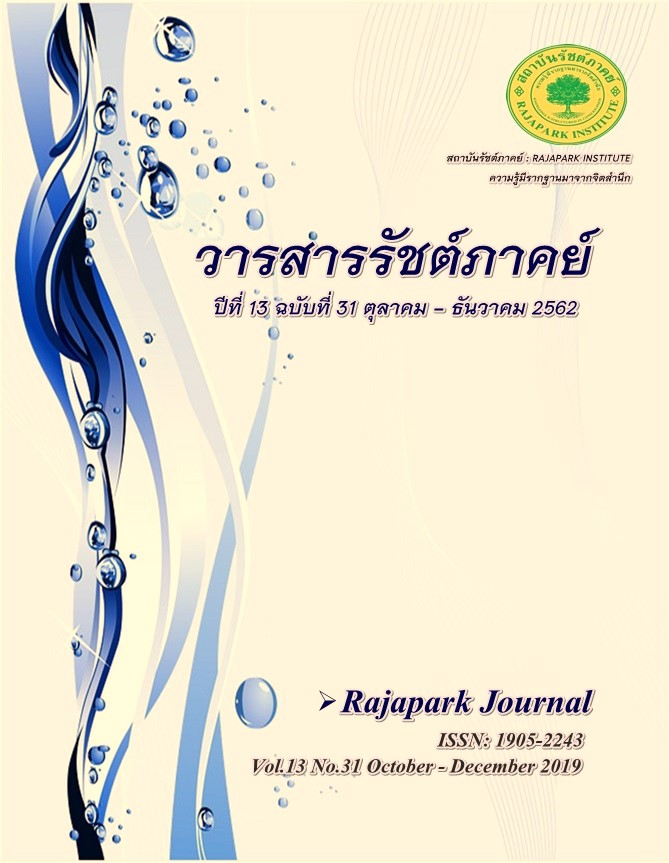Causitive Factors Influential to Operational Effectiveness in Information Technology for Private University Lecturers in Bangkok Metropolitan Region
Main Article Content
Abstract
From the study of Causitive Factors Influential to Operational Effectiveness in Information Technology for Private University Lecturers in Bangkok Metropolitan Region, the purposes were to 1) analyze the causative factors influential to operational effectiveness in information technology for private university lecturers in Bangkok 2) Metropolitan Region in order to create the model of structural relationships between causative factors and the operational effectiveness in information technology and 3) in order to analyze the way of direct influence, indirect influence and total influence of causative factors influential to operational effectiveness in information technology for private university lecturers in Bangkok Metropolitan Region. This qualitative research was conducted by data collecting from the administrators, lecturers and operational staff at 17 private universities in the population amount of 570. The statistics for data analysis were Confirmation Factor Analysis and Analysis Model of Structural Equation. The result for this study found that 1) P-value = 0.0502 more than 0.05 it indicated that Structural Equation Model from conceptual frame was suited with empirical data. 2) Causitive factors influential to operational effectiveness in information technology for private university lecturer in Bangkok Metropolitan Region in direct way was Operational Process Factors had the prediction weight was equivalent to 0.77 (= 0.77). 3) The result of structural analysis for explaining the way in the relation factor by hypothesis found that the relationship which was accordance with the setting hypothesis.
Article Details

This work is licensed under a Creative Commons Attribution-NonCommercial-NoDerivatives 4.0 International License.
Views and opinions appearing in the Journal it is the responsibility of the author of the article, and does not constitute the view and responsibility of the editorial team.
References
Arunsri, W. (n.d.). Lecture documents on the 20-Year National Strategy (2017-2036). Retrieved July 12, 2018, from https://122.154.22.188/newqsds/file_upload/yutthasart20ys.pdf
Boam, R., & Sparrow, P. (1992). Design and Achieving Competency: A Competency Based Approach to Developing People and Organizations. London: McGraw-Hill International (UK) Limited.
Boyatzis, R E. (1982). The Competence manager; A model for effective performance. New York: Wiley.
Chickering, A. W., & Reisser, L. (1993). Education and identity (2nd ed.). San Francisco: Jossey-Bass.
Chickering, A. W., & Kytle, J. (1999). The Collegiate Ideal in the Twenty-First Century. New Directions for Higher Education, 105, 109-120.
Dechawatanapaisal, D. (2000). Competency-based Human Resource Management. Journal of Human Management, 4(21), 11-18.
Gibson, J. L., Ivancevich, J. M., & Donnelly, J. H., Jr. (1994). Organizations: Behavior, Structure, Processes. Texas: Business Publications.
Gilley, J. W., and Eggland, S. A. (1989). Principles of Human Resource Development. Cambridge, MA: Perseus Books.
Gulick, L. & Urwick, L. (1937). Paper on the Science of Administration. New York: Institute of Public Administration, Columbia University.
Gurr, D. (2006). The Impact of Information and Communication Technologies on Informal Scholarly Scientific Communication. Retrieved July 12, 2018, from https://www.glue.umd.edu/~cpikas/878/Pikas_The_Impact_of_ICTs_on_ISSC_0506.pdf
Hoy, W. K., & Miskle, C. G. (2001). Educational Administration: Theory Research and Practice (6th ed.). Boston: McGraw-Hill.
Ministry of Education. (2011). Information and Communication Technology Master Plan for Education, No. 2 (2011-2013). Bangkok: Ministry of Education.
Mittaywin, T. (September 25, 2016). Personnel Management for Thailand 4.0. Post Today, p. B2.
Naiyapatana, O. (2005). Quantitative and qualitative research methods in behavioral science and Social Sciences. Bangkok: Srinakharinwirot University.
Office of the Higher Education Commission, Ministry of Education. (2007). 15 years long term education plan, No. 2 (2008-2022). Bangkok: Chulalongkorn University.
Pitaksa, W. (2016). The Model for Administration of Information Technology in Schools Under the Jurisdiction Office of the Secondary Education Service Area 6. Journal of Education Research Faculty of Education, Srinakarinwirot University, 10(2), 210-221.
Pleanbangyang, S. (2015). Effectiveness in Using Information Technology for Working of Local Administration Organization Officials Case Study: Amphoe Phutthamonthon. Veridian E-Journal, Silpakorn University, 8 (3), 1051-1062.
Sangtaku, O., & Chamaram, S. (2016). Administrative factors affecting the effectiveness of the information technology implementation in the management of provincial labour offices in the northeast. NRRU Community Research Journal, 10(2), 31-40.
Suntiwong, T. (2000). Organization theory and design. Bangkok: Thai Wattana Panich.
Thephasadin Na Ayudhya, W. (1987). Student personnel work. Bangkok: Faculty of Education, Chulalongkorn University.
Thianphut, D. (2003). Dynamic People Management. Bangkok: DNT Consultant.
Thitikornprapapong, K. (2015). The Information Technology Management Affecting to Internet Using the Earning Processes of Teachers in School under Phetchaburi Primary Educational Service Area Office 2. Veridian E-Journal, Slipakorn University, 8(3), 1-13.
Wannasathop, A. (2002). People: Competency. Challenges of modern organizations. Productivity World, 7(41), 14-27.
Wedchayanon, N. (2000). Thai human resource management. (2nd ed.). Bangkok: Faculty of Public Administration National Institute of Development Administration.
Woolner, S., Jacinto, A., & Martin, P. (2005). The small GTPase Rac plays multiple roles in epithelial sheet fusion-Dynamic studies of Drosophila dorsal closure. Developmental Biology, 282(1), 163-173.


